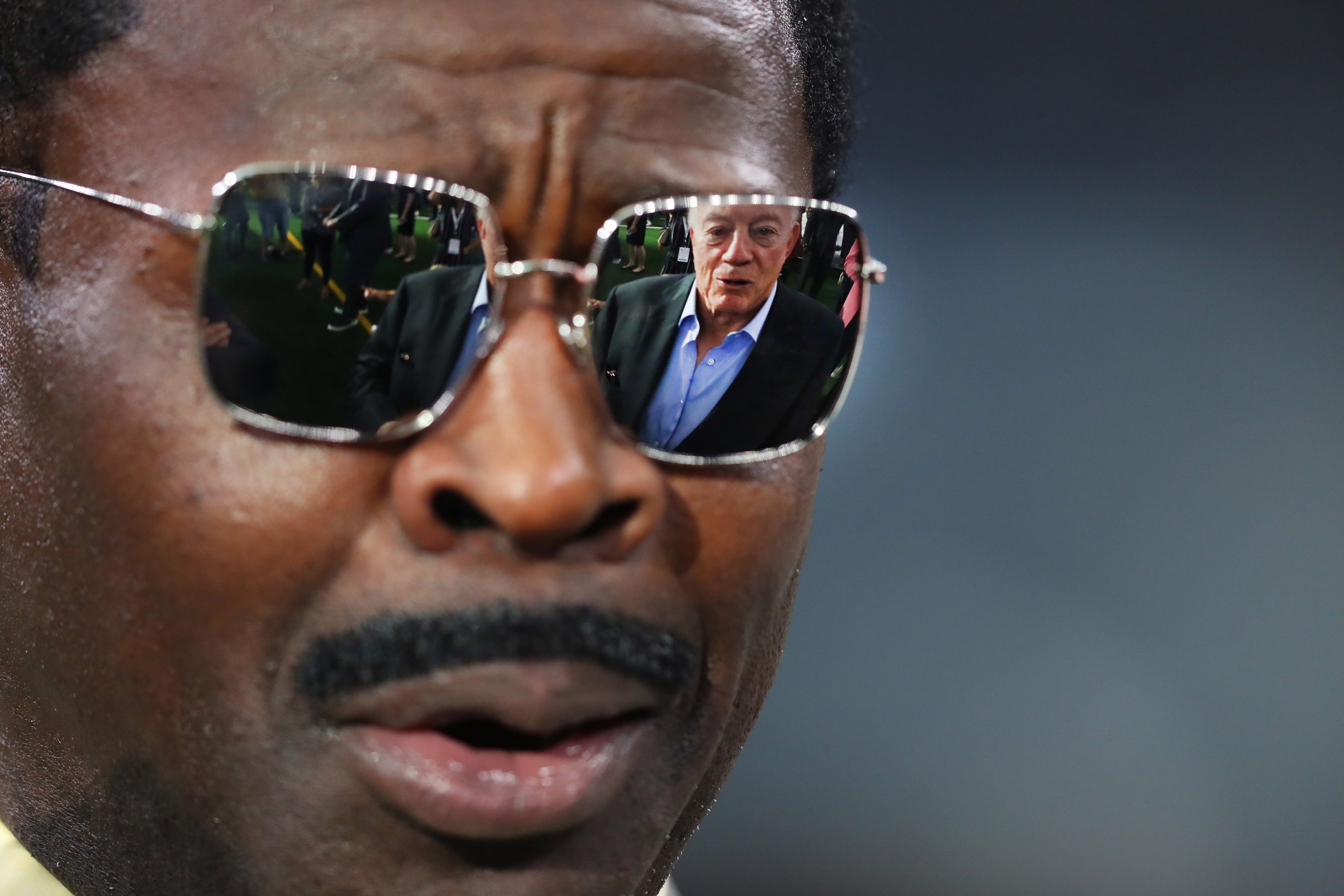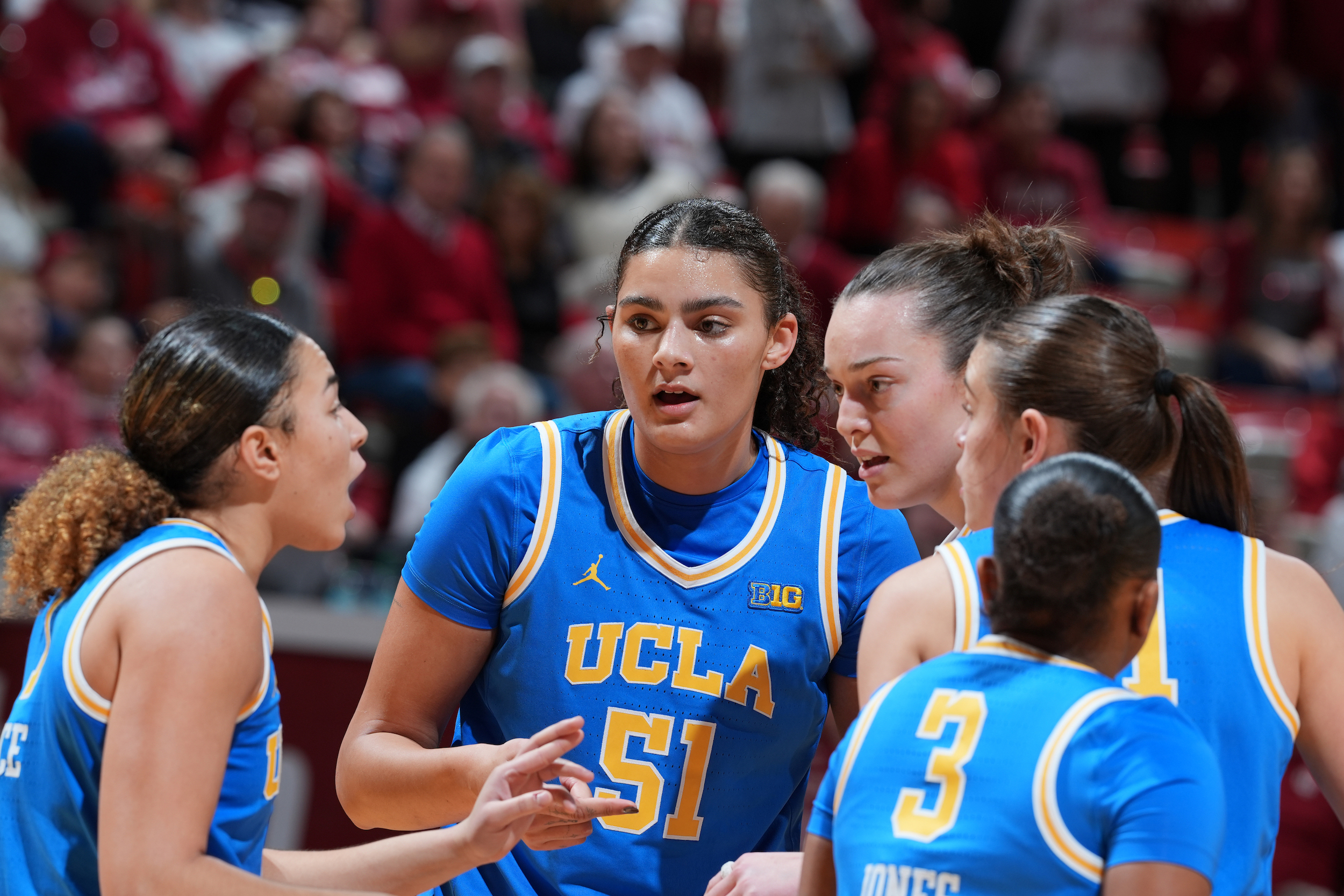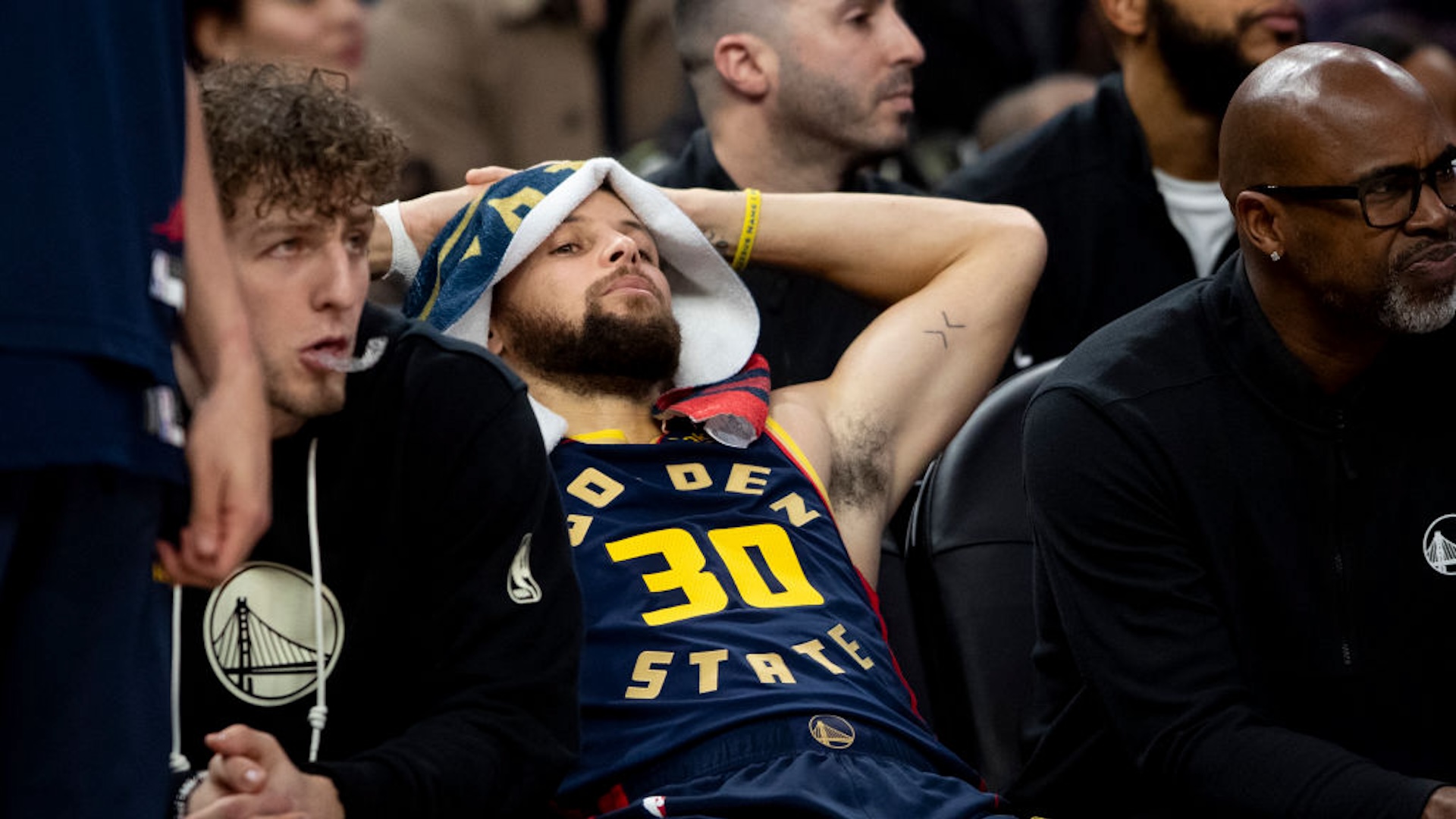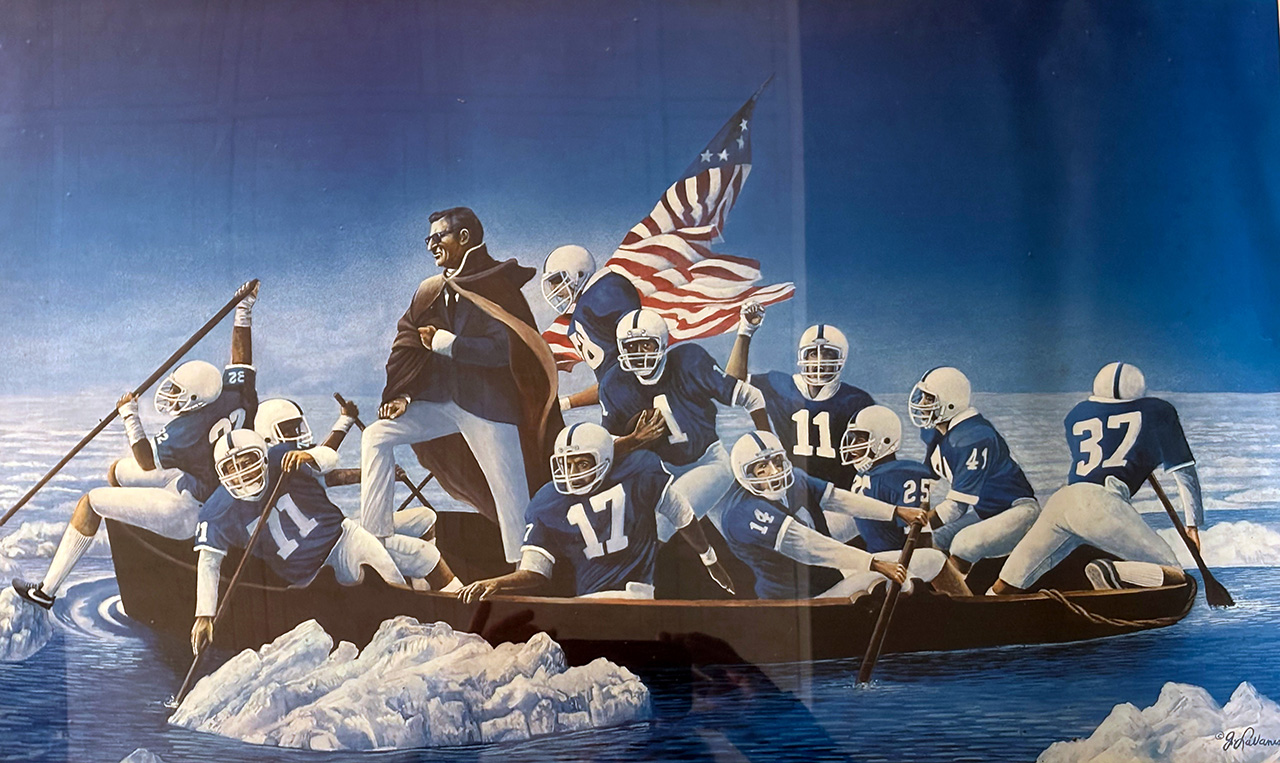Everyone who has held a job knows how it feels to be subject to the dim caprice of a grandiose and arbitrary boss, and to be captive to backward and deeply entrenched cultures, and to try and fail to get comfortable on the knife-edge of precariousness that is the inherent and defining condition of contemporary working life. NFL players have to negotiate all of that on television while also risking vast bodily harm and getting yelled at/about by strangers, but give or take all that, the dynamic tension holding it in place is the same as it is anywhere, everywhere else. The discrete tasks that make up different jobs are different, but the broader thing—doing something other than what you'd rather be doing, generally alongside other people, in exchange for money—applies too.
What makes it all work, when and where it does work, is not just a commitment to working toward a shared goal among the people doing the thing in question, but a tacit commitment to some small, subsidiary interpersonal understandings. At workplaces that work, this expresses itself through a tacit kind of sublimation, not just in terms of a new and more humble understanding of the relative importance of individual prerogatives relative to the broader collective pursuit, but also by accepting an unspoken suite of obligations to the people around you. It's pragmatic, mostly, but there's still some grace in it. Practically speaking, it is harder for a collective to reach its shared goal if everyone is not pulling in the same direction; the more ennobling part is how that understanding tends to manifest through big and little acts of helpfulness and support and assistance. Those actions reflect and honor, in a way that those broader goals would and necessarily could not, the fact that everyone involved is a person. It is a practical fact that people tend to pull most effectively in the desired direction if they feel supported and valued by the people around them, but also and more importantly that is just what people deserve.
(In workplaces that don't work, the calculation isn't much more complicated: The work isn't that important, and the people are even less important than that, and at some point the decision is reached that it's easier to just get new people to replace those who break or leave or die than it is to care for the ones you have.)
If you and I were talking about this, we might call this sort of caring something like "social responsibility," or just "not needlessly making things harder for everyone else because you for some reason wanted to." When football coaches talk about this kind of thing, as they do, the branding tends more towards Bill Belichick's typically pithy and appropriately joyless "do your job." Earlier this week, Michael Irvin—one of the great individual performers of his NFL generation and a core figure in a Dallas Cowboys dynasty that proved a team could be cohesive and high-functioning in this one essentially collective way while being floridly pathological in every other one—found another way to express it. Irvin was talking about the Cowboys, which is part of his job as an opinionated and occasionally mysteriously sweaty NFL commentator, and more specifically was addressing the fact that the Cowboys are not one of the 13 NFL teams to have hit the league's COVID-19 vaccination threshold, and not terribly close to becoming one.
Here is what Irvin told the Fort Worth Star-Telegram's Clarence E. Hill Jr.:
It should upset them. Dude, you’re not thinking right. I don’t give a damn. Nothing else can be more important. You’re not going to get this [winning a Super Bowl] easily. And not being one of the [vaccinated teams] says there’s other things to a great number of people on this team that are more important than winning championships and that makes me worried.
...“If you’re not one of the [vaccinated] teams are you really thinking about winning a championship?”
It is worth grading everything that Irvin says about the Cowboys on something of a hyperbole curve. His bombast is overstated even by NFL analyst standards under normal circumstances, and he is categorically incapable of talking about the Cowboys in anything but this Maximum Skeletor tone. There's no reason to believe that Irvin would talk about the national campaign to get people vaccinated against COVID in anything like similarly heated terms, although again he does not talk about any topic in similarly heated terms. But while we're all probably happier and better off not knowing where Irvin himself prioritizes the national vaccination campaign vis-à-vis the Cowboys' pursuit of their first Super Bowl since 1995, there are still some useful things to find in here.
The most obvious, and the most contextually funny, is that this is one of the greatest and most defiantly individualistic individual stars of his era essentially running Belichick's pokerfaced Do Your Job worldview through the NFL Media Rhetoric Enhancement Protocols until it emerges as something thunderingly righteous. This isn't remarkable in itself; athletes tend to curdle into this kind of no-excuses blowhardery as they get further and further from their playing days. But while this is unmistakably a conservative argument for vaccination—how can you say you are serious about excelling at work and avoiding distractions and destroying your rivals if you won't protect yourself against the virus with a vaccine?—it is also the first such argument for vaccination that we've seen in earnest, even all these months into the push.
Some of this is down to the signature defects of the nation's two major parties—Democrats are uncomfortable with even vague we're-all-teammates rhetoric, because of the responsibilities and (extremely popular) policies it implicitly commits them to, and Republicans are too dependent upon leveraging media-driven derangement and ambient grievance to make an affirmative case for anything, and also their party's figurehead is like 72 hours away from saying, You won't take these fake and unfair Shots if you love me. In a broader sense, that political failure reflects a certain shared cowardice and defeatism. In a democracy that works not just as poorly but as little as ours does, it is just easier not to attempt difficult things. The penalty for that failure to try is in human terms astonishingly vast, but in political ones relatively small, mostly because of the unspoken consensus that things can't or anyway won't be made much better through state action. Both parties agree, in ways that vary more in degree than in kind, that it is better or at any rate easier to let the marketplace sort all this out.
It is notable that the market, and specifically the imperatives that raise and sustain not just mainstream conservative media but the thousand flavors of grifters and amoral influencers that drive the misinformation economy, produces both the active derangement and the much more common overwhelmed confusion that are currently making it harder than it should be to get people vaccinated. But also the market doesn't care. It doesn't care about the wellbeing of the people that make it go, which we know because it has already blithely forced them to risk death just to keep the gears moving. But also it doesn't care about being hypocritical. This is about inputs and outputs, and as employers—the ones that own professional sports teams very much included—realize that they stand to benefit in some basic ways from a vaccinated workforce, they will begin to make that preference felt. They are not customarily subtle about things like that.
This is why, for instance, college football programs have had a much easier time getting their players vaccinated than NFL teams have. Lord knows it is not that college coaches are more motivated to provide for their players' safety, but 1) those coaches have the ultimate in leverage over those players and 2) their abiding coachly distaste for distractions will invariably take precedence over even the most slaveringly dipshitted personal beliefs. Irvin's argument for vaccinated Cowboys is not about some smug exhortation to Believe Science, or support for some community of care in the workplace, or about anything but success along the lines that the game dictates. It is about results.
Somebody in that damn locker room needs to say, ‘Hey man, we’re going to have a chance, are you vaccinated? Let’s go through this because this could be two weeks, a healthy dude missing games. In this league that could be it for you. The [wrong] person misses two weeks, and that’s it. You’re [butt] is out. I’ll fight a [expletive].
Fort Worth Star-Telegram
There will be more of this, and while it lacks the ethical or communal window-dressing of more humanistic arguments for vaccination, it might also be likelier to work. Witness, for instance, how sweaty and wan the counterargument of self-appointed NFL anti-vaccination spokesdingus Cole Beasley looks by comparison.
That’s not what that means. You can be vaccinated and not do all the right things football wise to be at your best. All it means is players are gonna be out there with covid and we won’t know cause they only get tested once a week so the NFL can make their money. https://t.co/VukRFeeOp3
— Cole Beasley (@Bease11) July 19, 2021
Beasley's skills as a communicator, relative to Irvin, are roughly in proportion to his capacities as a wide receiver, relative to Irvin. More to the point, though, all that Beasley has in response are qualifications and obfuscation and suspicion. It is unwise to use Beasley as a stand-in for any broader group, but there is in his flustered, finger-pointing umbrage something that is very easy to recognize—a sort of load-bearing defiance, a storm of blustering delusional bullshit that is supposed to look masterful and tough-minded and independent but which is very easily identifiable as someone desperately trying to seem less vulnerable than he is.
Culturally, America denies the crushing vulnerability that is daily forced upon us from every direction, because it is easier to ignore it than to somehow justify it as the price of freedom. As individuals, Americans hide from that vulnerability, because they can't deny it and because they've been taught to be ashamed of it. But in a culture whose last surviving shared value is more or less "Do Your Job," there are only so many ways for this sort of thing to go. You can make your own grace within the circumstances you're handed, or you can wait until your boss makes the decision for you. Only one of those is ever going to feel like freedom. The slot receiver demands to be recognized as a righteous sovereign wolf, living independent of care or conscience relative to the rest of humanity. Of course it's not very convincing. He's just another guy with a job.





